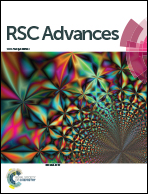Carbon nanotube reinforced flexible multifunctional regenerated cellulose films for nonlinear optical application
Abstract
Flexible regenerated cellulose/multiwalled carbon nanotube (RC–CNT) composites were successfully fabricated using a simple solution blending technique. The influence of functionalized multiwalled carbon nanotubes (f-CNTs) on the mechanical, electrical, thermal and optical properties of the regenerated cellulose was evaluated. Field emission scanning electron microscopy (FESEM) confirmed the uniform integration of f-CNT into the regenerated cellulose (RC) matrix. The tensile results indicated that the mechanical properties of the RC film increased considerably with f-CNT loading. The composites with 1.0 wt% f-CNT content (RC–CNT1.0) showed 60% increase in Young's modulus and 40% increase in elongation at break in combination with 50% increase in toughness, compared with RC film. The measured electrical conductivity of the composite film (RC–CNT1.0) was 6.2 × 10−4 S cm−1, which is significantly higher than that of the RC film (6.8 × 10−12 S cm−1). Improvement in conductivity as well as dielectric permittivity values of the RC–CNT composites can be attributed to the unique network structure of f-CNT in the RC matrix. The RC–CNT composites showed high dielectric constant in combination with low dielectric loss, confirming their suitability for capacitor applications. All the composites showed a good optical limiting effect at 532 nm. The third-order nonlinear optical properties of composite films were investigated by Z-scan technique at a wavelength of 532 nm with pulse duration of 7 ns. The conductivity, thermal, dielectric, mechanical and nonlinear optical (NLO) properties were found to increase with f-CNT loading. Thus, the RC–CNT composites have turned out to be excellent next generation materials for energy storage and photonic devices.


 Please wait while we load your content...
Please wait while we load your content...